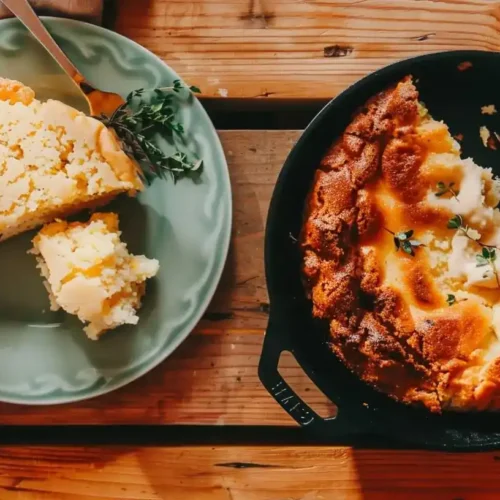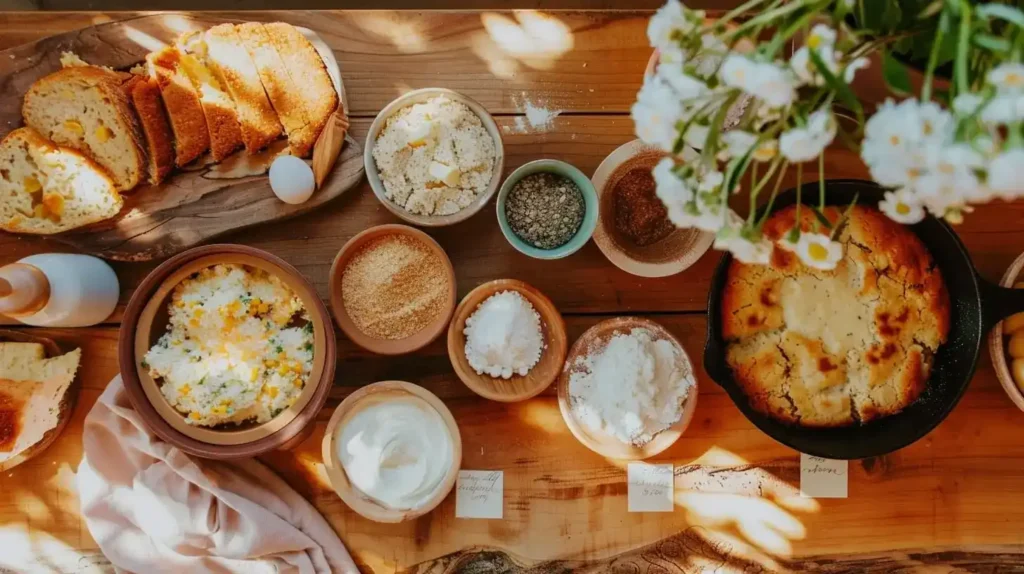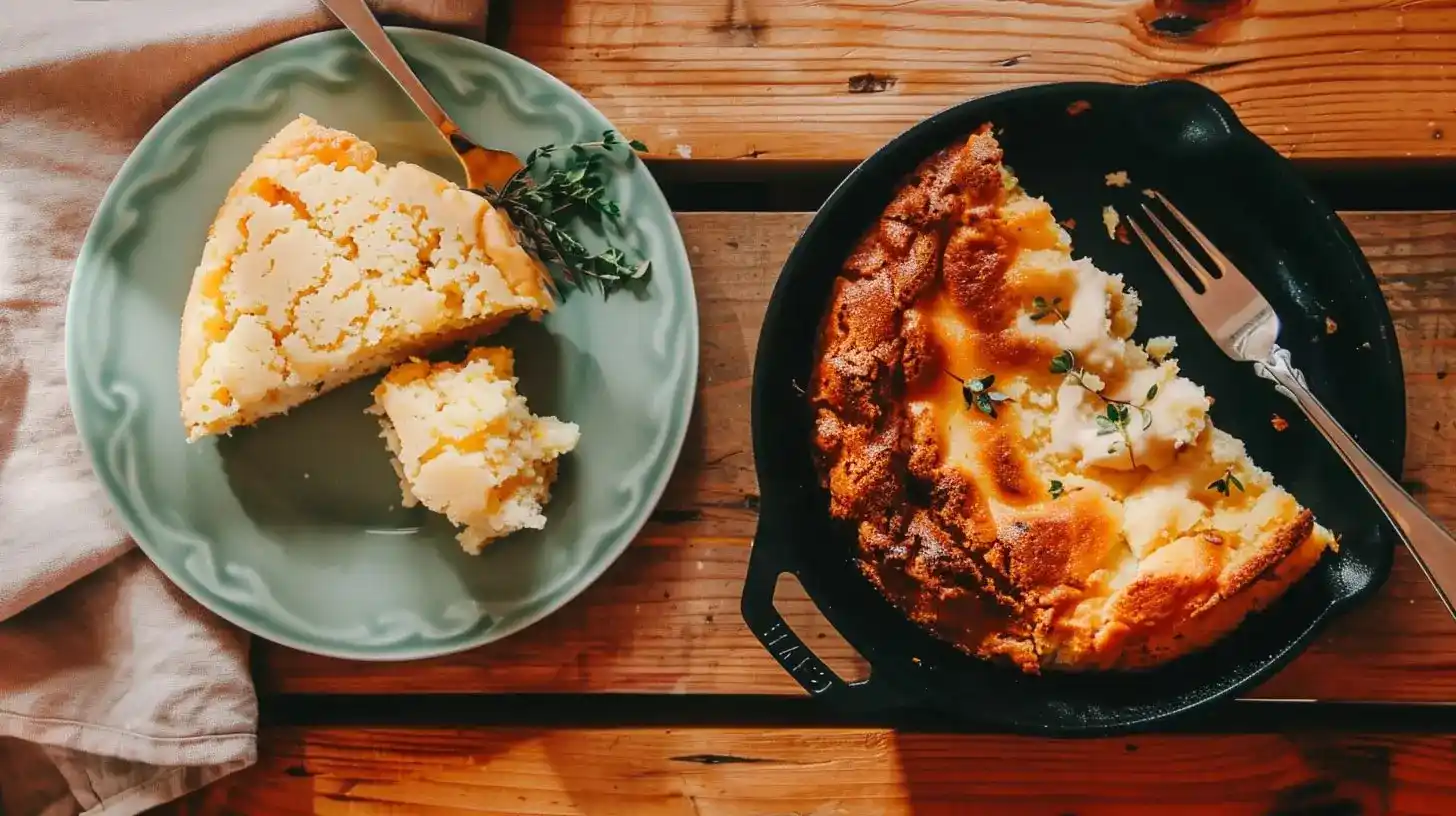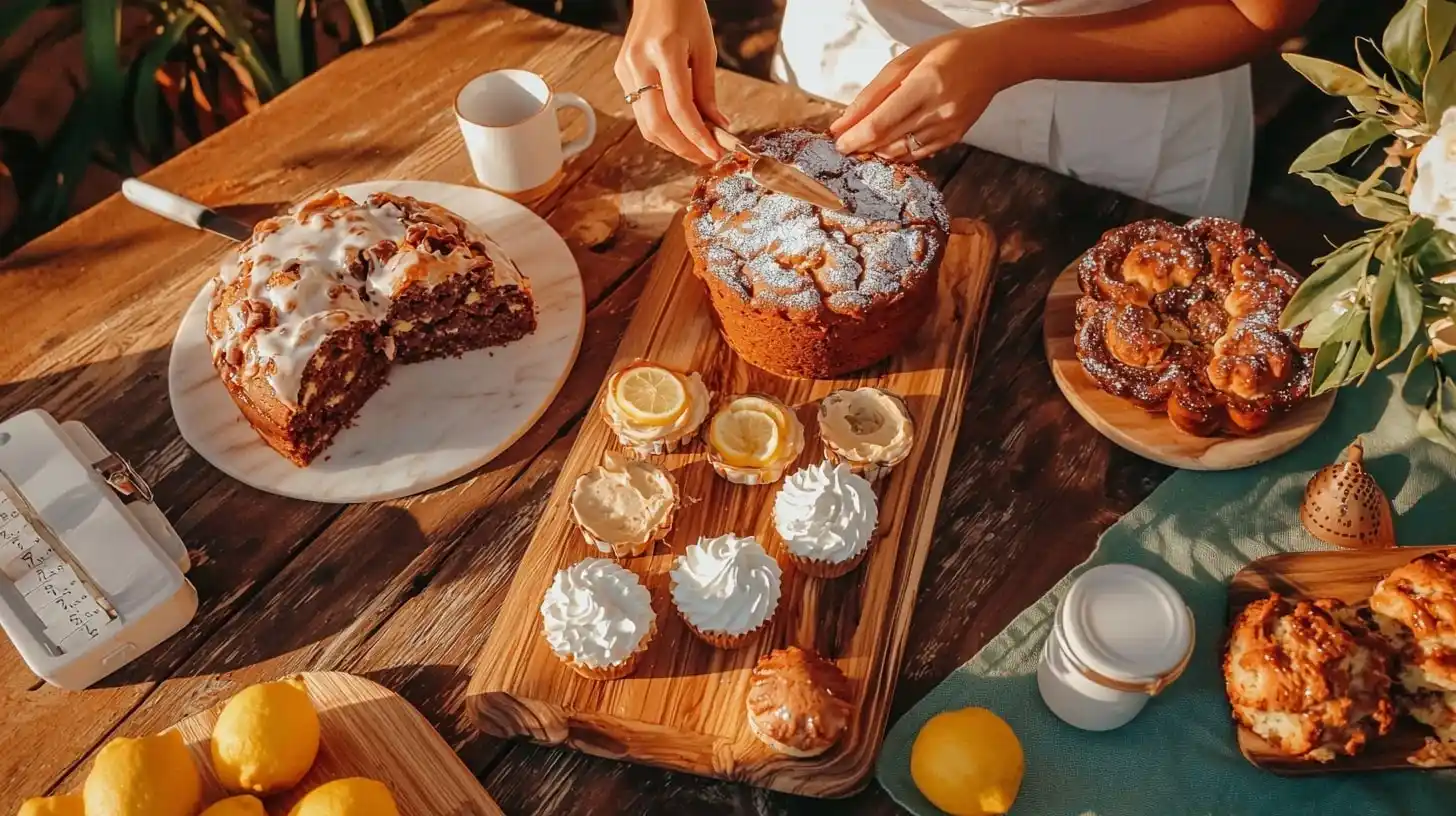The Great Cornbread Debate began at my first holiday dinner with my husband’s family. Born and raised in Kentucky, my grandmother had taught me that cornbread was savory, never sweet, and always baked in a cast iron skillet. But there at my in-laws’ Northern table sat a cake-like, sweet, fluffy bread that they called “cornbread.” My confusion must have shown on my face because my mother-in-law laughed and said, “You’ve never had cornbread like this before, have you?”What is the difference between cornbread and southern cornbread?
That moment sparked my fascination with What is the difference between cornbread and southern cornbread?. Growing up, I never questioned our family’s cornbread—it was simply what cornbread was supposed to be. But that dinner revealed how deeply regional cooking traditions run, and how passionately people defend their version of “authentic” recipes.
“Cornbread defines your culinary heritage more than almost any other food,” my grandmother would later say when I called to tell her about this discovery. “It tells the story of where you come from.”
Table of Contents
Table of Contents
Why Understanding What is the difference between cornbread and southern cornbread?
Knowing the What is the difference between cornbread and southern cornbread? helps you appreciate the rich culinary traditions behind these quick bread recipes. Here’s why these distinctions matter:
- Regional identity: Cornbread styles reflect deep cultural and historical influences in American cooking.
- Recipe success: Understanding the differences ensures you’ll create the authentic version you’re craving.
- Flavor expectations: Northern and Southern cornbreads deliver entirely different taste experiences.
- Serving compatibility: Each style pairs differently with various foods and occasions.
- Family traditions: Appreciating regional variations helps preserve meaningful food heritage.
While my best Southern cornbread recipe reflects my Kentucky roots, learning about Northern variations has enriched my collection of cozy breakfast recipes and broadened my appreciation for America’s diverse food traditions.

Hybrid North-South Cornbread
Ingredients
- 1¼ cups cornmeal (preferably stone-ground)
- ¾ cup all-purpose flour
- 2 tablespoons granulated sugar
- 1 teaspoon baking powder
- ½ teaspoon baking soda
- ½ teaspoon salt
- 1 cup buttermilk
- 2 large eggs
- 2 tablespoons bacon drippings
- 2 tablespoons unsalted butter, melted
- Extra bacon drippings or butter for the skillet
Instructions
- Place a 9-inch cast iron skillet in the oven and preheat to 425°F.
- In a large bowl, whisk together cornmeal, flour, sugar, baking powder, baking soda, and salt.
- In a separate bowl, whisk together buttermilk, eggs, bacon drippings, and melted butter until well combined.
- Pour the wet ingredients into the dry ingredients and stir just until combined. Do not overmix.
- Carefully remove the hot skillet from the oven and add about 1 tablespoon of bacon drippings or butter, swirling to coat the bottom and sides.
- Pour the batter into the hot skillet – it should sizzle when it hits the pan.
- Return the skillet to the oven and bake for 20-25 minutes, until the top is golden brown and a toothpick inserted in the center comes out clean.
- Allow to cool in the skillet for 5 minutes before cutting into wedges and serving.
Notes
5 Fascinating Differences Between Cornbread and Southern Cornbread

1. The Sugar Debate: Sweet vs. Savory
The most contentious What is the difference between cornbread and southern cornbread? is undoubtedly sugar content. Northern cornbread typically contains 1/4 to 1/3 cup of sugar, creating a sweet, dessert-like bread. Southern cornbread, on the other hand, traditionally contains no sugar at all, or perhaps just a teaspoon to enhance the natural corn flavor.
My grandmother would often say, “If it’s sweet, it’s not cornbread—it’s cake.” This sentiment echoes throughout the South, where Southerners don’t put sugar in cornbread as a matter of regional pride. When I make cornbread for my children, who’ve grown up in a region with both styles available, I always explain this distinction as part of their food education.
2. Flour Ratios: Cornmeal Purity vs. Mixture
Traditional Southern cornbread uses a much higher ratio of cornmeal to flour—some purist recipes use 100% cornmeal with no wheat flour at all. Northern cornbread, conversely, often contains equal parts flour and cornmeal, creating a more cake-like texture.
“The more cornmeal, the more authentic the Southern experience,” my mother would explain. When making cornbread with my daughter, I show her how the different ratios feel in your hands—Southern batter is grittier, while Northern batter feels smoother and more like cake batter. This tactile lesson helps her understand regional cooking in a hands-on way.
3. Cooking Vessel: Cast Iron vs. Baking Dish
Perhaps the most visible difference between cornbread and Southern cornbread is the cooking vessel. Authentic Southern cornbread is always baked in a preheated cast iron skillet, creating that distinctive crispy crust that’s considered essential to the Southern experience.
Northern cornbread, meanwhile, is typically baked in a regular baking dish or pan without the preheating step. My father-in-law was amazed the first time he watched me make cornbread, heating the cast iron skillet with oil until it was sizzling hot before adding the batter. “That sound!” he exclaimed at the satisfying sizzle. “I’ve never seen cornbread made that way.”
This methodological difference isn’t just tradition—it fundamentally changes the texture and experience of eating the bread. When adding an extra egg to cornbread, the skillet method becomes even more important for structure.
4. Fat Sources: Bacon Drippings vs. Butter
Southern cornbread traditionally uses bacon drippings or lard as its fat source, a practice that dates back to when sustainable cooking meant using every part of the animal. Northern recipes typically call for butter or vegetable oil, creating a distinctly different flavor profile.
My grandmother kept a coffee can of bacon drippings by her stove specifically for cornbread. When I make buttermilk cornbread, I sometimes use half butter and half bacon fat as a compromise that honors both traditions. This blend creates a complex flavor that my husband calls “the perfect marriage of North and South.”
5. Texture and Crumb: Crumbly vs. Cake-like
The final fascinating difference between cornbread and Southern cornbread lies in the intended texture. Southern cornbread is meant to be crumbly and somewhat coarse—a texture perfect for crumbling into a bowl of beans or sopping up pot likker from greens.
Northern cornbread aims for a moist, cake-like consistency that holds together when sliced. Neither is wrong—they simply serve different purposes in their respective regional cuisines. My children have learned to expect different textures depending on what we’re serving with the cornbread, understanding that the Southern style works better with certain dishes.
How to Choose Between Cornbread Styles
After years of making both styles, I’ve developed some guidance for choosing between cornbread and Southern cornbread:
For serving with chili, soups, or stews: Northern-style sweet cornbread provides a pleasant sweet-savory contrast.
For serving with beans, greens, or barbecue: Southern-style savory cornbread complements these flavors without competing sweetness.
For breakfast: Northern-style with a touch of honey or jam works beautifully for morning meals.
For authentic Southern meals: There’s no substitute for traditional Southern cornbread if you want the genuine experience.
For children or those new to cornbread: The Northern style often appeals to palates unaccustomed to the more assertive Southern version.
Answers to Your Cornbread Questions
Q: Can I make Southern cornbread if I don’t have a cast iron skillet?
While traditional Southern cornbread requires cast iron, you can approximate the experience using any oven-safe pan that can be preheated. The crust won’t be identical, but the flavor profile can still be authentic. My mother once used a metal cake pan in a pinch—not perfect, but she called it “emergency cornbread.”
Q: Is one style healthier than the other?
Southern cornbread typically contains less sugar and more whole grain cornmeal, potentially making it the healthier option. However, its traditional use of bacon fat increases saturated fat. Each style can be modified for health concerns while maintaining its essential character.
Q: Can I create a “hybrid” cornbread that everyone will enjoy?
Absolutely! My family’s compromise recipe uses just 2 tablespoons of sugar (less than Northern but more than Southern), a 2:1 ratio of cornmeal to flour, and half butter, half bacon fat. It’s baked in cast iron but has a slightly softer texture than traditional Southern cornbread.
Embracing Cornbread Diversity
Understanding the difference between cornbread and Southern cornbread has enriched my cooking and deepened my appreciation for America’s diverse food cultures. These regional variations aren’t just about ingredients—they’re about history, economics, available resources, and cultural identity.
When my children someday leave home, they’ll carry with them an understanding of both cornbread traditions. They’ll know the stories of their Kentucky great-grandmother’s cast iron skillet cornbread and their New England grandparents’ sweet, cake-like version. And perhaps most importantly, they’ll understand that food traditions deserve both respect and flexibility.
Which cornbread style resonates with your family’s traditions? Or perhaps like us, you’ve created your own perfect hybrid that honors multiple heritages?
With warmth, Sophia
for more recipes follow me in facebook and pinterest and twitter





